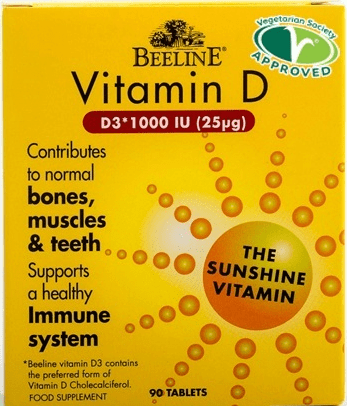Vitamin D Dosage for Optimal Intake by Age Group
Consuming the recommended daily Vitamin D dosage is important for good long-term health. The Food Safety Authority of Ireland (FSAI) have published recommendations on the optimal intake of vitamin D for people in Ireland by age group. FSAI recommend vitamin D supplements for everyone in Ireland.
Vitamin D Report
In 2023, The Food Safety Authority of Ireland (FSAI) Scientific Committee have published a report on vitamin D recommendations for people in Ireland between the age of 5 and 65 years old. It clarifies the optimal daily dose of vitamin D for each age group, that current dietary intake is too low, and how people can overcome the widespread vitamin D deficiency in Ireland.
The Food Safety Authority of Ireland (FSAI) research is the first investigation into how people aged between 5 and 65 years in Ireland can achieve optimal daily intake of vitamin D. The study aims to ensure that the population know how to consume the required vitamin D dosage for long term health. The report follows 3 separate FSAI vitamin D nutritional studies covering infants up to 12 months old, young children aged 1 to 5 years old, and older adults aged 65 plus.
The reports will now form the Department of Health’s national guidelines on Vitamin D.
The Food Safety Authority of Ireland Recommend Vitamin D Supplements
In the report, The Food Safety Authority of Ireland (FSAI) and World Health Organization (WHO) recommend vitamin D supplements for everyone in Ireland.
In particular, FSAI highlight the importance of vitamin D supplements for children, teenagers, pregnant women and people of dark-skinned ethnicity. These are the people who are at the highest risk of vitamin D deficiency.
The Importance of Vitamin D
In our recent article, we discuss Vitamin D benefits in-depth. Vitamin D is vital for a properly functioning immune system. It is also essential for healthy teeth, bones and muscle function.
Professor Kevin Cashman, Chair of the Public Health Nutrition Subcommittee that prepared the FSAI report, highlighted the importance of vitamin D and the risks of vitamin D deficiency at certain stages of life.
Vitamin D Deficiency
According to FSAI, Vitamin D deficiency is common in Ireland and across Europe.
In Ireland, cloudy conditions can reduce the capability of the body to synthesise Vitamin D, even in the Summer.
Nutrient deficiency is prevalent across all age groups and ethnicities. However, children, teenagers, pregnant women and people of dark-skinned ethnicity are at the highest risk of vitamin D deficiency.
Vitamin D plays key role in the musculoskeletal system. Therefore, it is especially important to consume sufficient vitamin D during high-growth stages of life. These include childhood, teenage years and during pregnancy. Vitamin D facilitates skeletal growth and development in kids and for the unborn foetus during pregnancy. It also supports the mother’s bone health during a time of change in the body.
Ethnicity and Vitamin D Deficiency
People of dark-skinned ethnicity are at higher risk of vitamin D deficiency.
Melanin is a substance that produces skin pigmentation in our bodies. Darker skin has more melanin. This has a negative impact for vitamin D production. Melanin reduces the body’s ability to make vitamin D from UVB rays in the sunlight. Therefore, people of all ages groups who are of darker-skinned ethnicity have higher vitamin D requirements.
Health Consequences of Vitamin D Deficiency
The health consequences of vitamin D deficiency include poor bone health. This can cause rickets in children and osteomalacia in adults. Deficiency has also been linked with higher risk of contracting many other disorders and diseases.
Vitamin D Sources
The sun and our diet are the sources of Vitamin D.
In Ireland, there are low levels of sun for a large portion of the year. This means that people in Ireland are dependent upon food and supplements in their diet for vitamin D intake.
Also, the amount of vitamin D in the food of the diet of a typical person in Ireland is generally limited. Therefore, vitamin D supplements are recommended for everyone in Ireland.

Recommended Vitamin D Supplement Dose
How much Vitamin D should you take? The FSAI recommend a daily vitamin D supplement. The recommended vitamin D dose for healthy people of each age group are below for babies, children, teenagers, adults and older adults.
Kids Vitamin D Dosage
Children 5 to 11 years old a daily, who are healthy should take a vitamin D supplement containing a dosage of 10 µg or 400 IU each day.
Teenagers and Adults Vitamin D Dosage
Teenagers and adults aged between 12 and 65 years old should take a daily vitamin D supplement containing a dosage of 15 µg or 600 IU.
Infant Babies Vitamin D Dosage
An infant is a young baby from 0 to 1 year of age. Vitamin D supplementation for babies depends upon whether the baby is breastfed, or is fed infant formula. This is because infant formula is fortified with vitamin D as well as other nutrients.
It is recommended that babies up to 12 months old, who are being breastfed, should be given a daily vitamin D supplement containing a dosage 5 µg or 200 IU of vitamin D.
Babies from 0 to 1 years of age, who are fed infant formula, should not be given a daily vitamin D supplement, if they are getting more than 300ml of infant formula a day.
Young Children Vitamin D Dosage
The FSAI state that most young children of 1 to 5 years old in Ireland were found to have inadequate vitamin D intake.
In 2020, the FSAI recommended that children aged 1 to 5 years olds should take a daily vitamin D supplement containing a dosage of 5 µg or 200 IU. Supplements should be taken at least between the extended Winter period of October to March.
Older Adults Vitamin D Dosage
According to FSAI, vitamin D deficiency is also prevalent amongst older adults over 65 years old in Ireland.
The Department of Health have previously issued advice recommending daily vitamin D supplementation for people aged 65 years and older.
In 2020, the FSAI recommended people aged over 65 years old, who are generally healthy and living independently, should take a daily vitamin D supplement containing a dosage of 15 µg or 600 IU.
Older adults, who are housebound or with limited or no sunlight exposure, should take a daily vitamin D supplement containing a dosage 20 µg or 800 IU.
Vitamin D Supplementation
Pregnant women are recommended to take a vitamin D supplement all year round.
Kids, teens and adults of fair-skin ethnicity are recommended to take a supplement for at least 6-months of year between October and March.
People of darker-skin ethnicity are recommended to take a supplement all year round.
It is advised to consume the recommended vitamin D dose for your age group. Excessive consumption of vitamin D can be harmful.
Ensure that you and your family get the recommended daily dosage of vitamin D. Beeline Healthcare have a range of vitamin D supplements for all age groups.


